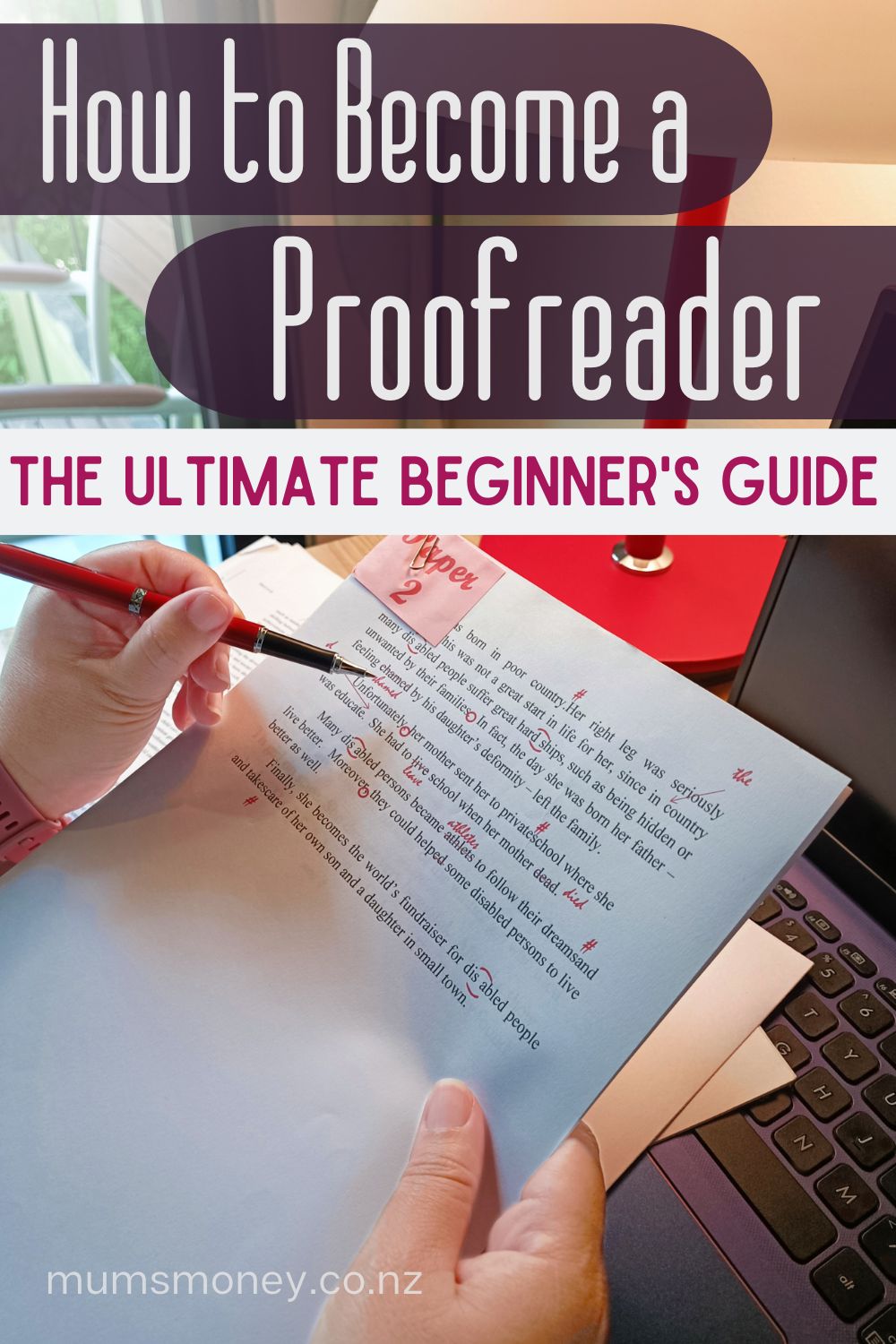Have you ever wondered how to become a proofreader?
If you’re interested in scoring well-paid proofreading jobs that you can carry out from the comfort of your own home this Mum’s Money guide will take you through everything you should know.
So you can decide whether or not running your own proofreading business would really work for you.

Table of Contents
Proofreading skills are in demand, and therefore online proofreading jobs are more plentiful than ever before.
If you want to become a freelance proofreader, there’s never been a better time to do it.
Why is this? All sectors of our lives are moving increasingly online, and – in a nutshell – this is what makes a proofreading career such a great idea right now.
With so many sites covering every single sector, there is so much content out there on the web.
Every single bit of content you read will have been proofread at some point.
Even when professional writers are responsible for content creation, there is no substitute for someone else casting a fresh, trained eye over their copy.
This is the case even when autocorrection is applied, as machines simply cannot tell as well as humans whether or not a piece of writing flows well.
A professional proofreader is responsible for ensuring every single bit of copywriting is as good as possible.
This means it should be free from grammatical errors, with correct spelling and a lack of punctuation errors.
The latter is something that software is not great at picking up on.
Could you be the one to ensure that what freelance writers produce is the best it can be?
The surprising thing is – establishing a career built around offering proofreading services may not be as tricky as it sounds.
In fact, if you have an interest in everything to do with the written word, you could already be well on your way to becoming a successful proofreader.
Any good proofreader will tell you that a love of reading is a must, as that’s what professional proofreaders will spend the lion’s share of their time doing.
The fact that you’re here reading this article means that you probably already have a keen interest in taking on your first proofreading job sometime in the future.
Once you’ve read this article, you’ll have learned all you need to know so you can set up your own business, converting something that already interests you into extra money – or even a full-time income.
From what proofreading involves, how much it pays and proofreading courses to where to find job postings from prospective clients, any aspiring proofreaders should start right here.
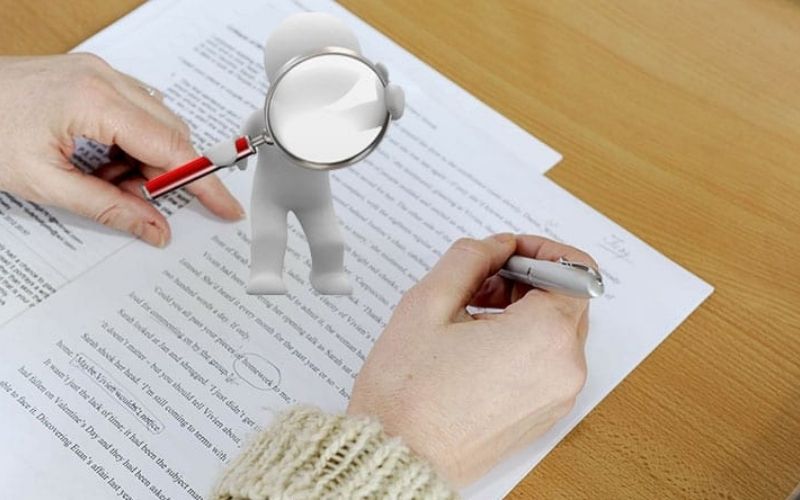
How to Become a Proofreader- Is It for You?
Can you spot grammar mistakes easily?
In fact, do you read ‘grammar mistakes’ and think the phrase might be better worded as ‘grammatical errors’?
Would you spot it if this post used the term ‘proof reading’ here and there, and note it as an inconsistency?
If the answer to the above questions is a resounding yes – and especially, perhaps, if these little faults actually bother you – then the lack of a formal education or qualification need be no barrier.
Proofreading is much easier when spotting errors or inconsistencies comes naturally.
So, if that describes you, then you already have a head start!
There are other required skills, however.
A great proofreader will also be capable of concentrating on the task for long periods of time.
They have the self-belief to attract clients and the ability to keep them.
Once established, like any freelancer, a proofreader will often obtain new business via word of mouth.
Repeat clients will also return for more if the service you’re offering is reliable, with the work completed to a high standard and in a timely fashion.
You, therefore need to be something of a self-starter. Are you self-motivated, and can you manage your time effectively?
Can you deliver a piece of work or project that you’ve committed to, and carry out your own research where required?
If the answer is yes… then proofreading really could be the career choice for you.
Whether you have an English degree – or indeed any bachelor’s degree – or not.
From novels or factual articles to academic papers or legal documents, there are lots of proofreader jobs just ready for the taking.
So why shouldn’t you grab a piece of the action?
What is Proofreading?
The fact that you’re reading this article means you may already have a pretty good grasp of what an online proofreader does.
It is important, however, to make some distinctions clear at the outset.
Proofreading is not the same as copy-editing
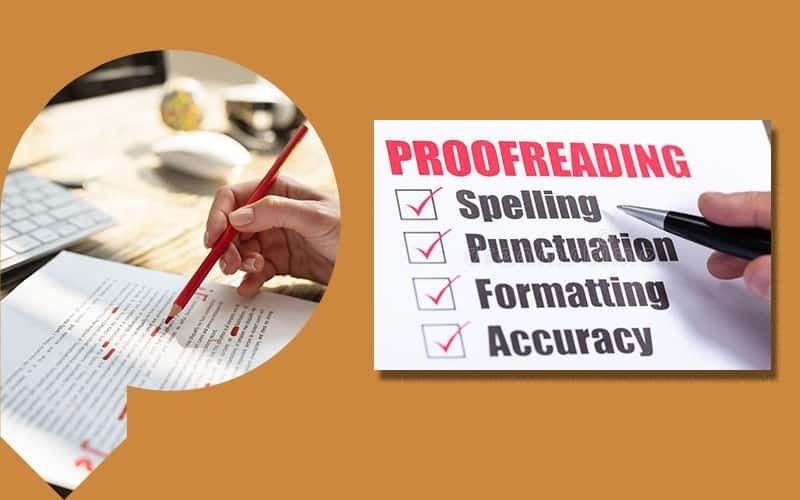
The terms proofreading and copy editing can often be used almost interchangeably, but they are not quite one and the same thing.
An experienced or certified proofreader earns a crust from spotting inconsistencies, errors and the incorrect use of grammar.
They do not, as a rule, restructure articles or rewrite content. A copy editor, however, would get involved with that.
The roles posted on many job boards will be looking for someone who can do both, so you could end up getting involved in doing some copy editing as well as proofreading when you take on that role.
The role of the proofreader
A trained or experienced proofreader will check that all kinds of copy are correct before they go live on a website or into print.
If you become a proofreader, you could work with all kinds of content, from academic writing such as white papers to the hottest new novel to hit the publishing house.
Whether you work for a lawyer, a blogger, an academic, a private company or a publisher, proofreading could take you from product descriptions to user manuals or documents produced by court reporters to eBooks and practice essays.
As well as much more.
The skills of the proofreader
We’ve already covered that a great proofreader needs a top-notch command of the English language, so now we’re delving into some specifics.
These are some of the skills proofreading job seekers really need to master.
English language
Is English your first language, and if not, is it up to that level?
A proofreader will need a better command of English than the average person, so if it isn’t up to that standard, then this may not be the career for you.
Reading
As a proofreader, you will spend most of your time reading.
The clue is in the job title! If you love reading – and find you always notice typos and grammatical errors in the process, then you’re already halfway there.
Spelling
Of course, it’s about spelling words correctly, but it goes a little deeper than that. Do you really know where to use ‘affect’ instead of ‘effect’?
Punctuation
Knowing when to use a comma, a semi-colon, a colon, a dash, or brackets can be critical when ensuring a text flows as well as it could.
There’s no such thing as ‘potato’s’, unless the potato actually possesses something (such as, perhaps the ‘potato’s beef chilli and cheese topping’. ‘Tomatoes‘ are a different matter, as this is the plural form of tomato.)
Tenses
There could be some tense moments between you and your client if you fail to spot the incorrect use of the past, present or future tense, prompting them to ask ‘why did you not saw that simple mistake?’
Capitalization
Are you familiar with when to begin words with a capital, such as when referring to a given name or an official title?
Formatting
Sometimes, those who want to become a proofreader in certain sectors will need a full understanding of the required formatting.
This could be as simple as how to mark subheadings correctly for uploading into WordPress or may concern whether the text is laid out in accordance with a specific format. Specific technical training may be required in this case.
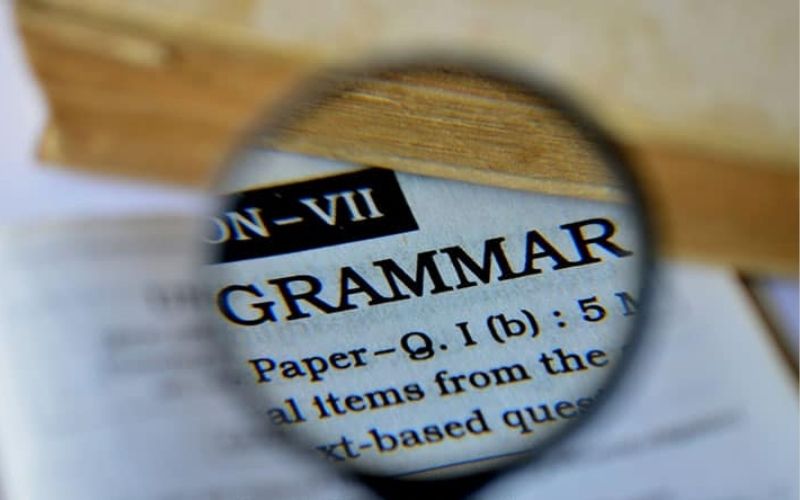
Marking
How you draw the client’s attention to an error or adjustment can also be critical.
You may agree to a simple system between you, such as using highlighted or red text, but for something like a publishing house, you may be required to adhere to a set of rules for marking each point.
This is because you must universally understand the system, the publisher and the typesetter.
Types of Proofreader
There are several kinds of proofreader.
Some specialise in a certain area, such as academia, law, medicine, science or technology, while others work in more generalised context.
There are pros and cons of each.
General proofreading
Anyone who creates or commissions written material may require the services of a proofreader.
So your clients could include students, bloggers, copywriters and businesses, all of whom may wish to have their content checked over before submission or publication.
Proofreading for publishers
A general proofreader may also work for a publishing company.
Checking over work before it reaches the final stage of production is critical to the publishing house that wants to project a professional image, as content containing errors does not give the best impression of their business.
Publishers are likely to employ experienced proofreaders rather than rookies, however. If you fancy this line of work, it could be something to aim for in the future.
Specialised proofreading
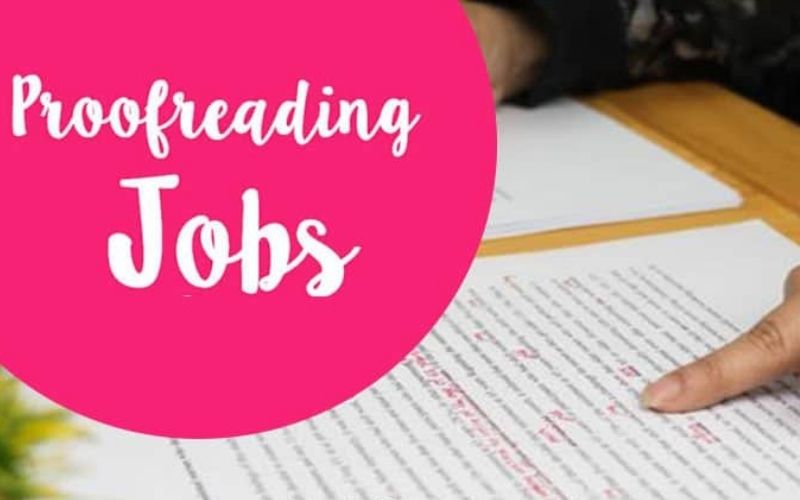
If you do have the know-how to work in a specialised field such as medicine, law, academia or science, you may well find that you can command higher rates for proofreading jobs.
This is not one to blag your way into, however.
You may be required to understand how court reporters put together a picture of the day’s legal proceedings, for instance, complete with all the required legal jargon.
To check over an informative article in a scientific or technical field may require familiarity with what the author is writing about, while anyone working in the academic field would benefit from having a degree in the appropriate subject.
Medicine is another area that can be littered with jargon, and if you don’t know what the terms mean it will take you far longer to finish the task of proofreading a piece.
If you do have the required knowledge – congratulations. You could be on the fast track to higher rates of pay, even from the start!
Proofreading Courses
So do you need to take a proofreading course?
The short answer is no – but you may feel more comfortable about prospecting for clients when you’ve armed yourself with some insider knowledge.
Proofread Anywhere
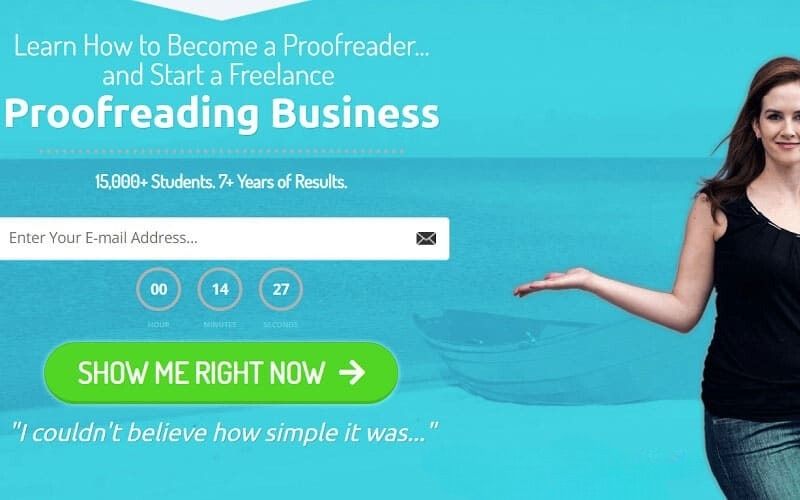
Some taster courses are available for free, so you have nothing to lose by trying one out.
Proofread Anywhere is one of the most respected, and host Caitlin offers a free 76 minute workshop to introduce you to what proofreading is all about.
Check it out here.
Udemy
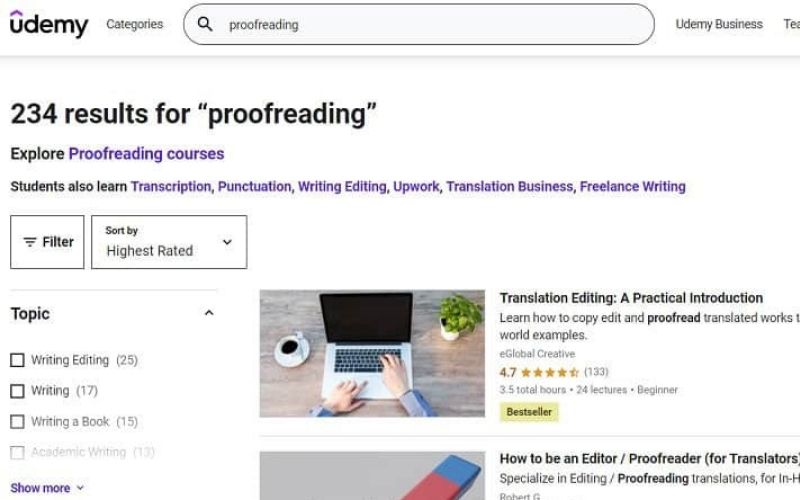
There are various courses on Udemy. As they’re very affordable they are definitely worth at least a look.
We recommend filtering your search by the top rated, which quickly and effectively separates the wheat from the chaff.
Take a look right here.
Louise Harnby Proofreader
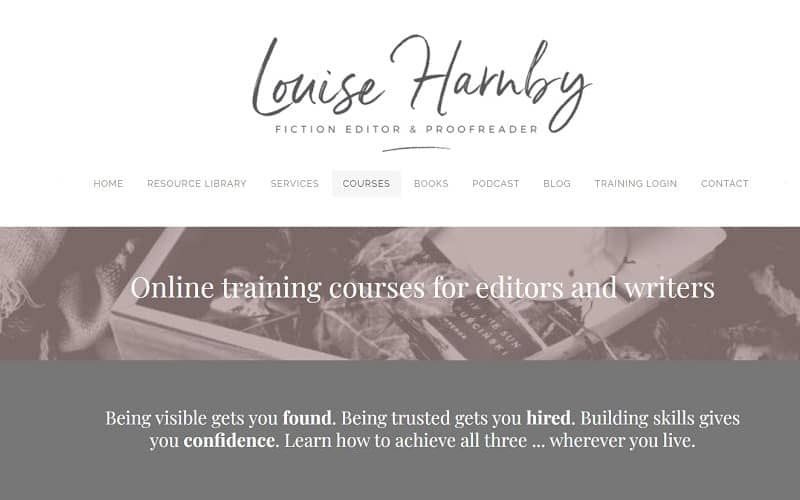
For an inside glimpse into the world of proofreading and editing, take a look at Louise Harnby’s website.
As one of the best in the business, she really does know what it takes – and can share that with you via her range of courses.
Where to Find Proofreading Jobs
So where so you start when you want to find work in the varied and rewarding proofreading field?
Here are Mum’s Money’s recommendations, sorted by type.
Freelance proofreading jobs
Freelance sites
The usual freelance sites such as Upwork, Freelancer, CloudPeeps and Fiverr are great for beginners.
It’s completely free to sign up, and you can be connected with all kinds of potential clients from across the globe.
Networking via LinkedIn can be a great way to secure proofreading gigs.
It takes a little time to make the right contacts, but you may need just one to get the ball rolling.
Having your own professional website, even if it’s just a few simple pages, can help to make you look the part.
Recruitment sites
Get Editing Jobs
Get Editing Jobs is like Indeed, but focuses purely on editing roles rather than general employment.
It’s a good place to start your search, as it gives you an idea of what’s out there. Take a look here.
MediaBistro
This site concentrates on connecting job seekers with creative and media-related roles.
You can share your email address to receive alerts, so if a suitable gig pops up you can get in there quickly. Find out more here.
Reedsy
Reedsy acts as a go-between for those who need proofreaders and those who can provide this service. You’ll have to fill out your profile to get started.
Specialised sites
Proofreading Services
Proofreading Services accept applications from all over the world.
At the time of writing, they pay between USD $19 and USD $46 per hour. To apply, you need to take a 20-minute test, which you can access here.
EditFast
EditFast want to find writers, editors and proofreaders, and have a longer signing up process than with others.
While they require skills, they do not specifically state that you need experience, making this a good bet for beginners.
OneSpace Freelancers
This site sometimes has proofreading jobs available – as well as other positions in the likes of graphic design and transcription.
You can sign up with OneSpace Freelancers even when there are no suitable vacancies, and they may make contact if something comes up.
Writing Jobz
This site is searching for proofreaders to work in various fields such as academia, book publishing and blogging.
So it’s simple to find something that suits you. Read all about Writing Jobz here.
Scribendi
Scribendi employ proofreaders and copy editors to work remotely. Hundreds of freelancers are on their books.
This Canadian company is committed to supporting their freelancers and offer full support, incentives and the chance to connect with others.
Find out more here.
Gramlee
Gramlee say they’re seeking editors, but as the work involves fixing errors in the text it can be classed as proofreading.
You’ll need to submit an online application and wait to see if Gramlee gets in touch. See the form here.
Wordvice
Wordvice offers opportunities for freelance editors and proofreaders.
They have some pretty prestigious clients, such as top universities, and can be a great source of ongoing work.
Proofreading Pal
Proofreading Pal employs both students and experienced graduates, so you will need to hold – or be studying for – a college degree for this one.
You will also need access to certain software. Fill out the online form to apply.
A timed test would be the next stage of the process if someone does contact you.
Polished Paper
If you are prepared to learn editing systems like APA, CSE, MLA and Chicago formatting, then you might find success with Polished Paper.
Guides to these can be found on the website. You’ll be asked to complete a test comprising 35 questions, and to upload your resume.
English Trackers
This one is more niche – you’ll require either a PhD or experience to sign up.
If you do have a doctorate, you may be able to secure work through English Trackers as a beginner.
Otherwise, it’s perhaps one to reserve for when you’ve built up some experience.
Employed proofreaders
If you want to work from home as a proofreader, the good news is that many companies now hire remotely.
This gives you more job security, but is less flexible than freelancing. Try recruitment sites like Indeed if this option appeals to you.
How to Become a Proofreader – FAQs
How do I become a proofreader with no experience?
When you’re wondering how to become a proofreader, the key factor to remember is that it all starts with your drive and determination to succeed.
So ask yourself this before you even seek out a proofreading test.
What’s stopping you, if you want to find proofreading jobs that are interesting and will pay well?
Beware of ‘impostor syndrome’. There’s nothing special about those people who’ve already built their own proofreading business.
Try looking at it this way – the fact that they are a successful proofreader in fact simply shows you that it can be done.
As long as you can spot spelling and punctuation errors, are willing to develop your proofreading skills and can deliver work on time, you too could be the proud owner of a professional proofreading business.
What qualifications do you need to be a proofreader?
A formal education is not required to become a proofreader, though having a bachelor’s degree may initially give you an advantage.
The ideal qualification for some is – quite understandably – an English degree, as this inspires confidence in your grasp of language, grammar and spelling.
If you have that qualification, so much the better, but if not, there’s no need to despair.
A degree-level qualification does not mean that the holder necessarily has a superior understanding of sentence structure or can get to grips with Google Docs or Microsoft Word.
In time, most proofreading jobs will likely come your way due to word of mouth.
So if you can recognise key errors, check for the correct spelling and use of grammar and deliver work on time, you also have a head start.
Do you need to be certified to be a proofreader?
Not that many online proofreading jobs will actually require certification.
Experience, the ability to do the job and reliability are far more important.
If you see getting certified as part of the path towards becoming a freelance proofreader, then maybe that’s the route you should take.
Having training is never going to be a disadvantage – quite the opposite.
Not every successful proofreader has had any formal training, but taking a course may give you the confidence to carry through with your plan.
A good course will also equip you with skills that will be useful when it comes to doing the job – as well as making you stand out from other job seekers.
If getting certified would push you into seeking your first paid proofreading job, then by all means go for it!
However, unlike other professions, no certification is required to work as a proofreader in the US – nor in various other countries, such as the UK.
How much money does a proofreader make?
What you’ll be paid for your first proofreading job and several years down the line may differ widely.
Like all roles, proofreading work is more time-consuming for those without experience, and it therefore follows that you may be paid a lot less at first.
How much proofreaders earn depends on various factors, including the employer, the nature of the work and your expertise.
Like any freelancer starting out, you’ll probably find that potential clients want to pay you less than someone more established.
If this seems unfair, try putting yourself in their shoes.
Would you pay a rookie as much as an experienced contractor for other services, such as household repairs or bookkeeping?
In time, experienced proofreaders earn more than beginners.
That is likely to seem a lot more fair once you’ve joined those ranks in a few years’ time!
Do proofreaders make good money?
According to Indeed, the average salary for a proofreader in January 2022 was over USD $22 per hour.
As a beginner, you can expect to earn less, and as time goes by and you gain experience, you’re likely to earn considerably more than that.
Indeed also goes on to list some of the top US companies hiring proofreaders.
At the top of the pile, Medicins Sans Frontieres are said to pay over USD $41 per hour.
One of the proofreading sites Mum’s Money recommends, Proofreading Services, pays around USD $19 to $46 per hour, for instance.
Whether you consider that ‘good money’ is down to your lifestyle – and what you’re comparing it with.
What is your current or most recent hourly rate? How high are your outgoings? What kind of lifestyle do you want?
Factors other than cold hard cash should also be borne in mind.
What is being your own boss worth, as well as having no travel time or expenses and working exactly where and when it suits you?
Just for Fun – Proofreading Quotes
‘I was working on the proof of one of my poems all the morning and took out a comma. In the afternoon, I put it back again.’ – Oscar Wilde.
‘You’re never “keeping it real” with your lack of punctuation and proofreading; you’re keeping it unintelligible.’ – Austin Kleon.
‘One of the mugs Robin saw said Keep Clam and Proofread’ – Robert Galbraith.
How to Become a Proofreader – Final Thoughts
We hope this article has helped you on the way to becoming a professional proofreader.
If you’ve decided to go for it, you have nothing to lose by giving it a go.
For avid readers, it’s a dream career, and the fact that you can work as and when you like is just the icing on the cake.
